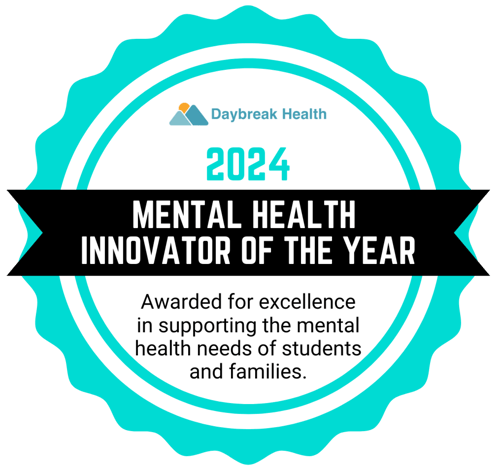Recognizing K-12 Districts for Excellence in Supporting the Mental Health Needs of Students & Families
.png?width=2000&height=219&name=Group%201%20(6).png)

.jpg?width=150&height=69&name=GCS_logo_Tag%20smaller%20(3).jpg)
Trailblazer of the Year 🏆
Guilford County Schools, one of the largest districts in the country and North Carolina, is always striving to make its schools the best place to learn, work, and grow. When it comes to the mental health and wellbeing of their nearly 70,000 students across 124 urban, suburban and rural schools, this is no exception.
Dr. Whitney Oakley, Superintendent of GCS shared, “the mental health space is now very much part of public education” and “ultimately bridging the gap that exists between a student's education and their health, whether it's physical health or mental health, provides equity. When we think about educational achievement, you can't have one without the other.”
Guilford launched their Better Together 5-year strategic plan in 2023 which reinforced their commitment to student wellness and safety, supported 400 teachers through the National Youth Mental Health First Aid program, and planned for the ESSER funding cliff by securing grants and partnerships to continue expanding their mental health supports, like the PRISM Project (Prioritizing Resources to Impact Student Mental Health).
Superintendent Oakley also recognizes the connection between mental health and absenteeism, leveraging additional mental health services to bring down their spike in absenteeism post-pandemic. Those mental health services include teletherapy through Daybreak, where Guilford was the first district in the state to have such a partnership. Not only do their mental health services support goals for student achievement and attendance, but including teletherapy in those services solves for some common barriers to care that their families experience.
The mental health leadership team at GCS includes Dr. Alex Tabori, Ph.D. the Executive Director of Mental and Behavioral Health Services, and Dr. Kimberly Steinke, the Chief Exceptional Children and Student Services Officer. Both have held various positions at the district and Dr. Oakley shared they are able to do “bigger things, faster.”

Onsite Partner of the Year 🏆
Serving 121,000 students, SDUSD is committed to strengthening systems and structures for students to quickly access mental health support, responding to students’ mental needs via prevention and providing early intervention during times of crisis.
SDUSD’s mental health team works tirelessly to assess each school's needs and culture in order to meet students and families where they are. Recognizing the growing need for mental health services, SDUSD partnered with Daybreak Health in 2021 to prioritize student well-being and success.
Over the past 3 years, SDUSD’s program with Daybreak has grown to include 7 full time clinicians, serving students K-12 across 34 campuses, supporting in areas including foster youth services, LGBTQIA+ support, executive functioning, and trauma informed practices. The team’s work is integral in helping students learn tools for success both in and out of the classroom, as well as creating lasting, meaningful relationships.

Community Collaborator of the Year 🏆
Manor ISD’s staff treat their community of families as members of their team. Dr. Robert Sormani, the Superintendent of Manor ISD shared,"Our school systems are a part of the communities we serve. There should never be a difference between us and them.”
The Manor ISD community serves 9,270 students from across Manor, Austin, and Pflugerville, TX. Mayra Hernandez leads a unique department in their district: The Whole Child, Community Partnerships & Engagement Department, with a mission to “enhance the well-being of our families by implementing an integrated and collaborative approach to address barriers and identify areas of support that encourage learning and growth in a safe and nurturing environment.”
Hernandez has created a robust system of support so that there’s equitable access to school-based services. Mayra’s vision extends beyond the walls of school buildings. The Whole Child team leverages mental health screening, school climate surveys, district mental health fairs, teletherapy, and direct interventions on campuses to make sure that no youth is left silently suffering. She even has an open conversation with the city mayor to educate and empower the broader Manor community.
District Superintendent Dr. Sormani talks about the importance of removing barriers that students may face to ensure they can be successful and that “these mental health supports are part of our school systems and they’re going to be for now and for good.”

Elementary Partner of the Year 🏆
Crystal Lake Elementary District 47 serves just over 7,000 K-8 students just outside of Chicago, IL. As the first district in Illinois to implement Daybreak’s programs, Kristin Schmidt, Director of Social Emotional Learning, believes this partnership will fill a much-needed gap for students and families.
She believes that, “By intervening early and providing tailored support, we anticipate a reduction in disciplinary actions, absenteeism, and the need for special education referrals as a result of these efforts.” District 47 supports the belief that students’ social and emotional well-being provides the foundation needed for all learning to occur, recognizing that students’ success can suffer when they are experiencing mental health issues.
The mental health team at District 47 seeks partners in mental health who share their goals of increasing equitable access, reducing absenteeism and disciplinary action, and who value strong integration with the on-the-ground team.
“Counseling accessibility is crucial for our families, and we're thrilled to be the first school district in Illinois to offer this additional support,” said Dr. Kathy J. Hinz, Superintendent. “Our district's strategic plan is focused on empowering all students as learners today and leaders tomorrow. Every student deserves to begin their school day ready to learn, and by addressing mental health challenges early, we're setting our students up for success not just in the classroom, but in their futures as well.".png?width=100&height=100&name=Ellipse%201%20(1).png)
Rural Partner of the Year 🏆
Oftentimes, rural districts don't have the same access to mental health services for students and families. OUHSD is located in Butte County, California, about 90 miles from the nearest major city, and serves about 2,500 high school students.
OUHSD’s mental health team works hard to find resources for students and families where transportation, distance, and lack of locally available clinicians are barriers to care, and district social workers are often working with full caseloads across multiple campuses.
While many community resources have months-long waitlists for care, or only accept certain insurance plans, partnering with Daybreak allows their team to quickly refer students to Daybreak’s teletherapy program. Teletherapy fills a major gap in mental health support for students by providing equitable and quick access to qualified mental health clinicians—regardless of a student’s insurance status.
"In Oroville, our students face a variety of significant challenges that impact their well-being and education. From the devastating effects of wildfires and smoke exposure to the struggles associated with poverty and housing insecurity, our community endures many hardships. These adverse experiences, compounded by limited access to healthcare and mental health services in our rural setting, can make it difficult for students to thrive," shared Jon Wood, Director of Education at OHSD. "Despite these challenges, we are committed to providing the support and resources our students and families need to build resilience and succeed, and this award highlights the importance of that mission."

Daybreak Partner of the Year 🏆
San Lorenzo Unified School District in Alameda County, California, serves 10,500 students from diverse communities. The district’s mental health team has built a multi-tiered system of support that provides equitable access to mental health service across their community.
The district has leveraged the benefits of teletherapy in their MTSS to connect their community to a broader team of diverse clinicians, and make it easier for students and families across the district to get connected to care where language, stigma, transportation, or financial barriers may otherwise prevent them from accessing support.
With 42% of their student population identifying Spanish as their primary language, it was essential that students and their families could work with therapists in-language for culturally competent care.
We commend the team at San Lorenzo for creatively weaving together multiple grant and funding streams to sustain their mental health programs and partnerships to support their students long-term.